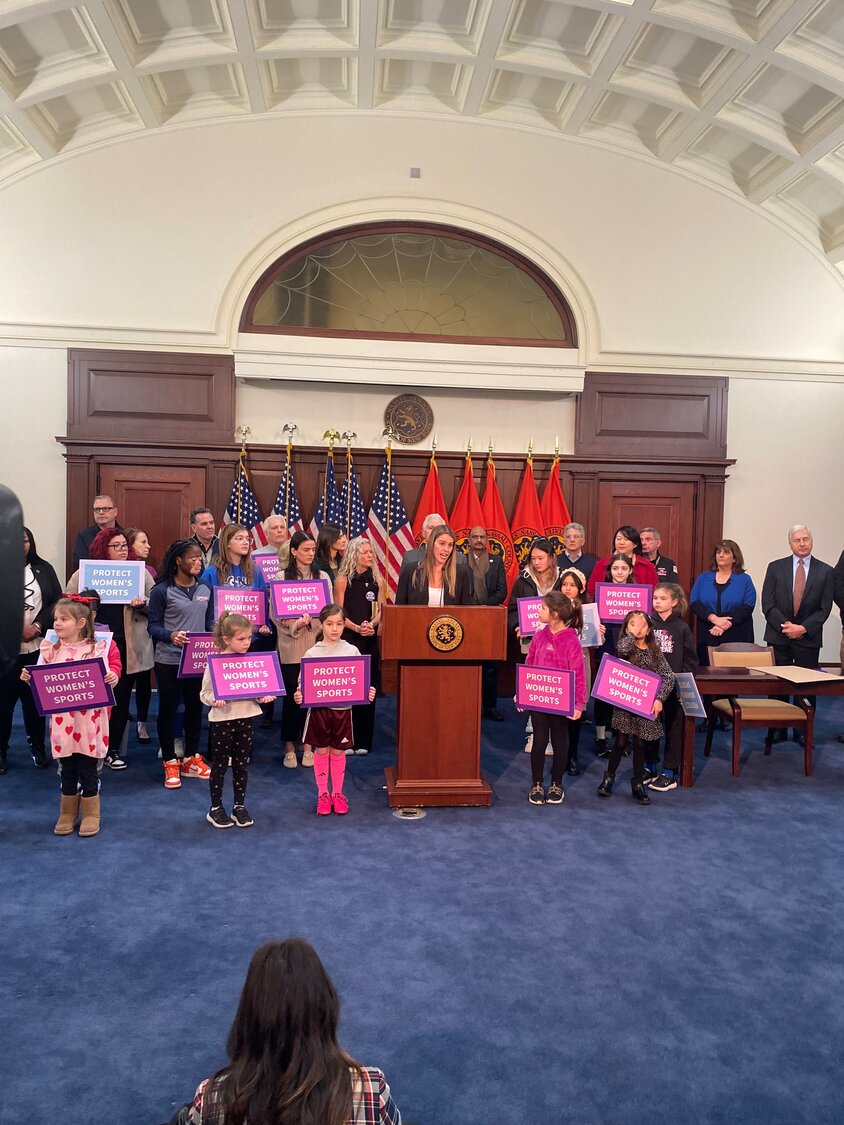Nassau County takes aim at trans athletes with new executive order
Thanks to Nassau County Executive Bruce Blakeman’s first executive order of the year, eyes are turning to the county as it becomes the newest battlefield of the United States’ culture war.
Blakeman’s executive order banning transgender women from playing sports on properties operated by the Nassau County Parks, Recreations and Museums Department has resulted in a lawsuit from the state attorney general’s office, outrage from numerous LGBTQ+ and civil rights groups, and divided the opinions of county residents.
Sophia Marchioli, a senior at North Shore High School and a member of the cross country team, expressed disappointment in the ban, explaining that she believed Nassau County was a more accepting place.
“I always thought of us as very inclusive and open-minded,” Marchioli said. “I was just so disappointed to hear that athletes and student-athletes who are passionate about their sport can’t participate simply because of how they identify.”
Samantha Goetz, Republican county legislator for District 18, which includes Glen Head, parts of Glenwood Landing and Oyster Bay, was with Blakeman on Feb. 22 when he signed the executive order. At the signing, Goetz, accompanied by her daughters, reflected on her memories of being a high school basketball player, defending the executive order as a way to protect and provide equal opportunities for athletes born biologically female.
She argued that women had severe physical disadvantages compared to men, and that she would have never been able to enjoy her athletic career if she had been competing against men. Goetz also asserted that the goal of the ban was to protect female athletes, not discriminate against transgender ones.
“This is a matter of protecting the integrity, fairness and safety of women’s sports,” Goetz said during the signing. “This is about protecting our female athletes, this is about making sure they’re not denied opportunities for scholarships, or any type of opportunity that comes from playing sports.”
Marchioli said that while there may be some truth to the idea that biologically male athletes have a physical advantage over biological females, it could still make them feel like “outsiders.” She added that she was especially concerned about how this would impact young trans people throughout the county, as transphobic attacks are on the rise throughout the country in areas where transgender laws have been passed.
“This ban could create a narrative that they don’t belong in their local community,” Marchioli pointed out. “I feel that it can impact how they think about themselves in relation to their community and their nation, especially because the LGBTQ+ community has been under fire recently by certain Americans who may be looking to silence their stories or take away their opportunities.”
The executive order does not prevent transgender men, or people assigned the female gender at birth who now identify as male, from competing in men’s sports. Marchioli said that the decision to not include transgender men in the ban showed “a hint of sexism,” since it implied that transgender men would have no impact on male sports.
“They’re saying that female athletes who are transitioning won’t disrupt male athletics but male athletes who have transitioned will disrupt that flow,” Marchioli said. “That’s slightly discriminatory and not an appropriate judgment for a government official to make.”
Blakeman has been quick to argue that the goal of the order is not to penalize transgender athletes, but to ensure equity for biologically female athletes.
“This is not precluding anybody from participating in sports,” Blakeman wrote. “What it is, is identifying that there are women and girls who spent a tremendous amount of time and effort to excel and compete in their sports that are women’s sports — whether it’s WNBA, whether it’s college, whether it’s high school, whether it’s just a community league — and it is an unfair advantage for someone who’s a biological male to compete against a biological female.”
Blakeman wrote in his executive order that an individual’s gender is defined as the individual’s biological sex at birth.
New York Attorney General Letitia James demanded that Blakeman rescind the ban on transgender athletes from competing in women’s and girls’ sports, saying the ban was a “discriminatory and transphobic executive order,” according to a press release on March 2. James said the order was a “clear violation” of state civil and human rights law and would subject all female athletes to “intrusive and invasive questioning.”
Sarah Kate Ellis, president and CEO of the Gay and Lesbian Alliance Against Defamation declared that the executive order does nothing to help or keep youth who live and play in Nassau County safe.
“Transgender youth want the opportunity to play sports for the same reason all youth do: to be a part of a team where they belong,” the statement reads. “Excluding girls from playing sports with their friends, simply because they are transgender, sends a dangerous message to young people: that it is okay to exclude people simply because you do not understand them.”
—Additional reporting by Roksana Amid, Parker Schug

 46.0°,
A Few Clouds
46.0°,
A Few Clouds 





